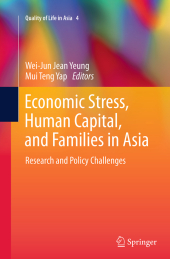 Neuerscheinungen 2016Stand: 2020-02-01 |
Schnellsuche
ISBN/Stichwort/Autor
|
Herderstraße 10
10625 Berlin
Tel.: 030 315 714 16
Fax 030 315 714 14
info@buchspektrum.de |

Mui Teng Yap, Wei-Jun Jean Yeung
(Beteiligte)
Economic Stress, Human Capital, and Families in Asia
Research and Policy Challenges
Herausgegeben von Yeung, Wei-Jun Jean; Yap, Mui Teng
Softcover reprint of the original 1st ed. 2013. 2016. xvi, 270 S. 15 SW-Abb., 25 Farbabb., 66 Farbtabel
Verlag/Jahr: SPRINGER NETHERLANDS; SPRINGER 2016
ISBN: 9401778426 (9401778426)
Neue ISBN: 978-9401778428 (9789401778428)
Preis und Lieferzeit: Bitte klicken
This book presents recent findings about the consequences and policy implications of economic stress for human capital development and family well-being in Asia. The scope of the chapters goes beyond the impact of current financial crisis to include the effect of economic deprivation families in Asia experience as a result of job loss, low-wage employment, and catastrophic natural calamities. The studies show how macro-level economic stress can filter down through households to affect individuals´ economic and socio-psychological well-being. The chapters reveal a wide spectrum of economic stresses experienced by families in Asia that is linked to poor human capital development, emotional distress, health problems, changing fertility patterns, more frequent geographic movement, and less supportive parenting behavior. The elderly, women, children, low-skilled workers are particularly vulnerable. The economic shocks in the past several decades have exposed the vulnerability of the family institution and the weaknesses in this region´s social protection system that can lead to detrimental long-term effects on human capital development. This book is relevant for researchers and students in fields such as Family Studies, Globalization, Development, Social Problems, Social Stratification, Social Inequalities, Poverty and Welfare, Education, and Social Policies.
Chapter 1: Introduction: Economic Stress, Human Capital, and Families in Asia: Research and Policy Challenges; Wei-Jun Jean Yeung.- PART I: OVERVIEW.- Chapter 2: Global Financial Crisis and Economic and Social Challenges for Asia and the Pacific; Noeleen Heyzer.- Chapter 3: The Impact of the Economic Crisis on Children in East Asia and the Pacific: A UNICEF Perspective (2009-2010); Samman J. Thapa and Mahesh S. Patel.- Chapter 4: The Long Reach of Early Childhood Poverty; Greg J. Duncan and Katherine Magnuson.- PART II: WOMEN, CHILDREN AND ECONOMIC STRESS.- Chapter 5: The 1997 Economic Crisis and Changes in the Pattern of Achieved Fertility and Ideal Number of Children in Korea; Doo-Sub Kim.- Chapter 6: Abandoned or Abandoning Men: Economic Stress, Gender Relations and Migration of Filipinas to Singapore; Janet M. Arnado.- Chapter 7: Economic Insecurity and Husband-to-Wife Physical Assault in Hong Kong: The Role of Husband´s Power Motive; Adam K. L. Cheung and Susanne Y. P. Choi.- PART III: ECONOMIC STRESS AND HEALTH.- Chapter 8: Economic Stress and Health among Rural Chinese Elderly; Wei-Jun Jean Yeung and Zhenhua Xu.- Chapter 9: Poverty, Perceived Economic Strain and Psychological Distress among Thai Older Adults; Kattika Thanakwang.- PART IV: SOCIAL SUPPORT DURING ECONOMIC HARDSHIPS.- Chapter 10: Social Networks and Reduction of Risk in Disasters: An Example of the Wenchuan Earthquake; Zhao Yandong.- Chapter 11: Human and Social Capital Dynamics in Economic Crises - The Impact on Poor Chinese Migrant Children in Hong Kong during the Far East Economic Crisis; Sam Wong.- PART V: ECONOMIC STRESS AND PUBLIC POLICY.- Chapter 12: Conditional Cash Transfers (CCTs): A Child Policy Strategy in Asia; Shirley Gatenio Gabel and Sheila B. Kamerman.- Chapter 13: The Impact of Economic Crises on Health: Past Evidence and Policy Implications for Asia; Kai-Hong Phua and Kai-Lit Phua.- Chapter 14: Policy Responses in an Unstable Globalized Economy: Multi-Stressed Low-Earning Families in Singapore; Irene Y. H. Ng and Kong-Weng Ho.- Chapter 15: Conclusion and Policy Implications; Yap Mui Teng.


